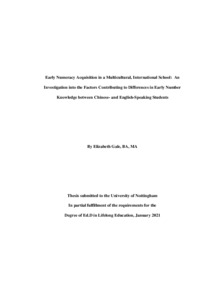Gale, Elizabeth M.
(2021)
Early numeracy acquisition in a multicultural, international school: an investigation into the factors contributing to differences in early number knowledge between Chinese- and English-speaking students.
EdD thesis, University of Nottingham.
![Early Numeracy Acquisition in a Multicultural, International School: An Investigation into the Factors Contributing to Differences in Early Number Knowledge between Chinese- and English-Speaking Students [thumbnail of Early Numeracy Acquisition in a Multicultural, International School: An Investigation into the Factors Contributing to Differences in Early Number Knowledge between Chinese- and English-Speaking Students]](https://eprints.nottingham.ac.uk/64227/1.hassmallThumbnailVersion/Elizabeth%20Gale_EdD%20Thesis_Early%20Numeracy%20Acquisition%20in%20a%20Multicultural%20International%20School.pdf)  Preview |
PDF (Early Numeracy Acquisition in a Multicultural, International School: An Investigation into the Factors Contributing to Differences in Early Number Knowledge between Chinese- and English-Speaking Students)
(Thesis - as examined)
- Requires a PDF viewer such as GSview, Xpdf or Adobe Acrobat Reader
Available under Licence All Rights Reserved.
Download (16MB)
| Preview
|
Abstract
The belief that primary aged Asian children are superior in their knowledge of mathematical concepts and numerical operations is widespread and prevalent within many educational contexts including early childhood schooling environments. Previous research has confirmed the higher mathematical performance of Asian children over their Western counterparts particularly in the realm of number knowledge and numerical operations within the earliest years of schooling. This study investigates the reality of early numerical differences in a multi-cultural American-based, international school environment in China. It explores the extent to which differences in numerical knowledge and abilities of Chinese- and English-speaking students aged 3 ½ to 4 ½ validate or refute prior research focused on early numerical differences between Asian and Western children. Through the employment of quantitative and qualitative research methods, the study also examines potential factors contributing to the apparent knowledge gap within the linguistically and ethnically diverse early childhood setting, including number-naming languages, parental and cultural influences, as well as teacher background, instructional practices and knowledge surrounding students’ mathematical abilities. The Junior Assessment of Mathematics early numeracy assessment, one-on-one teacher interviews, and a parent questionnaire were implemented, analysed, and interpreted as a means of exploring early numeracy knowledge and the contributing variables to the assumed difference between Chinese- and English-speaking students. The research findings revealed that regardless of age, gender or teacher class placement, the Chinese-speaking students outperformed their English-speaking peers across all modules administered within the assessment. In particular, knowledge related to subitising, number recognition, counting, and cardinality revealed substantial disparities such as a 1.5 to 2.0 stage level difference within early foundational elements of numerical knowledge which ultimately will have a significant impact on students’ long term mathematical and overall academic success as indicated by previous research. Likewise, the findings yielded noteworthy results including the vast similarities in the Chinese- and English-speaking parental perceptions of their children’s mathematical abilities, despite the drastic differences in numerical knowledge displayed by the students. However, in addition to the significant findings gathered within this study’s unique international school context, overall, this thesis confirms existing research that supports the notion that it is likely a combination of factors that contribute to the mathematical achievement gap between Asian and Western students. Based on the findings and confirmations accumulated through this research study, recommendations for future research within international school settings with diverse populations is suggested.
Actions (Archive Staff Only)
 |
Edit View |

 Tools
Tools Tools
Tools